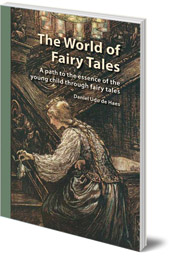Quick Look
- Explores the power and significance of fairy tales for very young children
- Discusses issues of metaphor, cruelty and morality in fairy stories, as well as tips for telling stories well
- An essential book for all Waldorf early years educators
A comprehensive look at the use of fairy tales in kindergartens, offering insight and advice to early years educators.
Description
Fairy tales span centuries and cultures, bringing their profound wisdom and insight to generation after generation of children. In this book, experienced Dutch educator Daniel Udo de Haes explores the significance of fairy tales for very young children.
He starts by asking why fairy tales are told in kindergartens, and discusses issues around metaphor, cruelty and morality which often arise in traditional fairy stories. He goes on to offer tips for telling fairy tales, and guides educators on how to choose specific fairy tales for specific children. He finishes with a note on the dangers of fairy explanations.
This is a comprehensive book for all early years educators who need to understand the power of stories for young children.
Reviews
'Drawing clear analogies between the child's journey into the school-age years and the truths and lessons in fairy tale language. Daniel Udo de Haes's discussion brings educators and parents new understanding to the ways in which well-told fairy tales prevent ''impoverishment through the loss of something that should still be a reality: the spiritual world in which the child should still be living.'' A modern classic for professional development and parent education.'
-- Kindling
Author
Daniel Udo de Haes (1899-1986) was born in Bali and studied in the Netherlands. He taught in a Steiner-Waldorf school then worked until his retirement as a teacher in an anthroposophical institute for children with special needs, in Zeist. After his retirement, he wrote a series of educational books for parents and teachers.
Barbara Mees is a translator living in the Netherlands.

